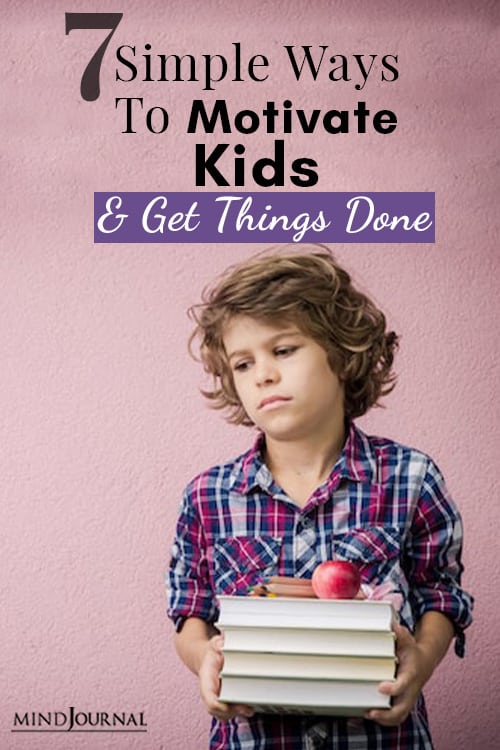It can be quite the task to figure out how to motivate kids to get things done since kids have a mind of their own, and not always the motivation of following through with everything. As a parent, the constant thought of “how do I get them to do anything” keeps running through your mind.
However, it is important to know that motivation comes from a set of brain chemicals that develop over a period of time as a result of certain experiences that occur in the normal course of life. The more a person experiences important life events, the more it develops. Similarly, the more a kid goes through life experiences, the smarter and more mature they get.
Some kids are active and self-motivated, while others may need a little help. So finding an effective way to motivate them becomes your utmost priority as a parent. If you’ve been wondering what you can do to motivate kids, then there are usually two ways of doing that.
Read 7 Ways To Encourage Kids with Words
They are as follows:
Extrinsic motivation
This type is usually used to encourage someone on the basis of external factors. This kind of motivation can be positive or negative in nature. Positive motivation may involve praises, and compliments and negative motivation involves fear or punishment.
Some examples of extrinsic motivation are:
- Playing a sport to win medals and trophies.
- Getting them to help around the house so they can go play with their friends.
- Completing school homework to watch TV.
Intrinsic motivation
This type of motivation drives them to do things that need to be done and not because they are being forced. Any person who has intrinsic motivation will get things done without wanting any praise because they want to learn.
Some examples of intrinsic motivation are:
- Playing sports because they enjoy it.
- Finishing their homework to make themselves feel proud.
- The ability to understand that helping around the house will help the other family members to some extent.
These are mostly based on rewards, punishment, or self-fulfillment. However, there are several other ways on how to motivate kids to get things done.
Here Are 7 Ways To Motivate Kids To Get Things Done

1. Stop annoying them.
Sometimes kids don’t do certain things because parents annoy them and pester them constantly to do it. One of the best ways to motivate kids is to stop annoying them by constantly telling them what to do. If your children are constantly upset and irritated with you, then they will never listen to you.
One of the best ways to motivate them is to show how much you trust them and have faith in them. Avoid making comments that imply that your child isn’t good enough, or that they are incapable of following through with their tasks. Assure them that you have full faith in them so that they never feel demotivated.
Read How To Get Your Kids To Listen: 9 Tips To Speak So Kids Listen
2. Stop comparing them with other children.
Comparing your kids with other children about their accomplishments is one of the worst things you can do to them, as a parent. Every child is different, so why would you compare your child with someone else? If you keep on doing this, it will not only demotivate them, it might also lead to depression, and anxiety, and even push them farther away from you. Your kid stops working hard when they see their parents appreciating other kids for their achievements but never them.
It is important to show them how much you appreciate their efforts, and use positive reinforcement to motivate them further. Your child will start working harder when they see their parents appreciating everything they do. Demeaning your kid is never the right way of motivating them to do things.
3. Encourage healthy competition.
Healthy competition is always good. Cheer for your child in the stands, whether it’s for a sport or for a spelling bee. When parents encourage their children and cheer for them, it has a massive positive impact on their confidence, and emotional state. They know in their mind and heart, that you will always stand by them, and help them win.
This will help them stay happy and motivated to work harder, be it academics, or extra-curricular activities. Don’t always emphasize the prize, rather teach them that participation and effort mean a lot too. As a parent, always remember that one of the best ways to motivate kids is by encouraging healthy competition and cheering for them.
4. Show interest.
Show interest in what your child is into whether it’s sports, dancing, or singing. Talk to your child and encourage them to pursue their interests. Showing interest will make your child feel like you trust them, and care about what makes them happy, not what you think should make them happy. You might not always relate to their interests, but never let that stop you from showing interest and encouragement.
This will ultimately motivate your child to get things done since they know at the back of their mind that they have your support and trust. This is probably one of the best things you can do for your kid, not just to motivate them, but to also make them feel better about themselves and their interests.
Read 4 Things You Can Do To Keep Your Kids Encouraged And Inspired
5. Plan out routines and structures.
Planning out a routine and structure for your child plays a very important part in developing motivation in your child. Having established family routines can eliminate any conflicts that your child may come across. For instance, getting their homework done at the right time, and at the right pace.
For example, a routine where your child works on their homework between 6 pm and 9 pm. There won’t be any conflict or arguments when they see that it’s simply how it’s done in the family. This will keep your kids motivated to get things done on time.
6. Empathy and active listening.
Sometimes pre-teens and teens go through a lot of physical and emotional changes. They may start displaying several mood changes like aggression, anger, getting into arguments over the smallest of things, or simply stay quiet and moody. In moments like these, it is important to empathize with your child about what they are going through, emotionally and mentally, instead of scolding them.
Try to understand how they are feeling, and why they are feeling the way they are. Try not to take their mood swings at heart, and give them that support and understanding, so that they open up to you about their troubles. Listening actively to your child can build trust in your relationship with them. This will motivate kids to perform better when they know that their parents trust them, and understand their struggles.
Celebrating your child’s accomplishments will not only boost their self-confidence, and happiness, it will ultimately help your child to get motivated to do what needs to be done. For instance, you can celebrate your child’s accomplishments with a special dinner, or take them out for a movie.
Acknowledging their hard work, and accomplishments will help them stay on the right track and will push them to do even better the next time around.
Read 19 Growth Mindset Ted Talks For Kids
It is important to work with your child to motivate them in order to help them, both emotionally and academically. Celebrating their accomplishments and listening to your child’s needs can go a long way. You will start to see positive results the moment your kid knows that you are on their side of the ring. And lastly, encourage your child to develop their intrinsic motivation with positive reinforcements so that they grow up to be confident and self-reliant individuals.













Leave a Reply